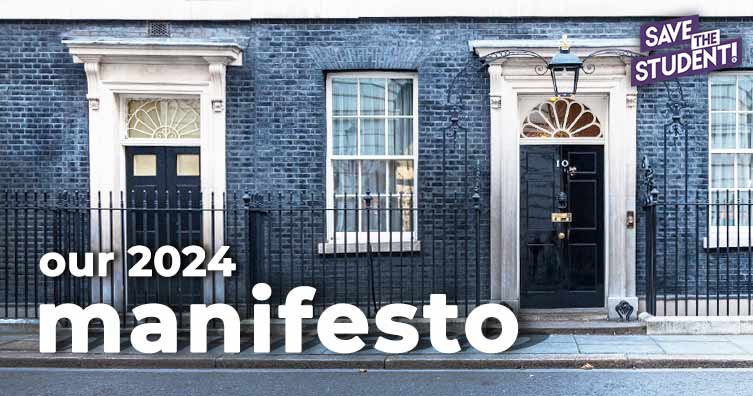The 2024 General Election is an opportunity for change, so we're calling on all parties to commit to our nine demands that will dramatically improve the lives of students and young people.

Credit: dominika zara - Shutterstock
Whether it's Maintenance Loan cuts, Student Loan repayment changes or the increasingly impossible dream of buying a house, it's fair to say that students have had a pretty rough deal over the past few years.
But now that an election has finally been called, change could be just around the corner. So we've listened to what you need and put together our nine key demands that we want all political parties to commit to in this election. It covers everything from Student Finance reform to help paying the bills, and it's all with the aim of improving conditions for you.
So please join us in calling on our political leaders to adopt these policies, and make sure you're registered to vote by 11.59pm on Tuesday 18th June!
Our election demands for students
These are the nine things we want to see all political parties commit to in the 2024 General Election, to improve conditions for students and young people:
-
Increase Maintenance Loans to catch up with inflation
Since 2020, the Maintenance Loan in England has lagged behind inflation, increasing by far less than the rate at which prices have risen. This means funding has been cut in real terms, with the loan now falling short of living costs by £582 every month.
We've passionately campaigned on this issue in the past couple of years, joining forces with organisations across the university sector to call for Maintenance Loans to catch up with inflation.
But the government hasn't acted, and according to the Russell Group, students in 2024/25 will now be up to £1,900 worse off than if loans had kept up with rising prices.
That's why we're calling on all parties to commit to increasing Maintenance Loans in England to catch up with inflation. And, to ensure students never see their funding cut by stealth again, we need to see reform in the system to guarantee Maintenance Loans will increase with actual rates of inflation, not projections.
-
Re-introduce Maintenance Grants on top of loans
Since Maintenance Grants were abolished in England in 2016, students from the poorest backgrounds have had to take out the biggest loans and leave uni with more debt.
This was a huge step backwards for social mobility, particularly as research has shown that students from the lowest-income backgrounds are more likely to be put off university through fear of debt.
Maintenance Grants should be reinstated on top of Maintenance Loans, increasing the overall level of funding available and ensuring the poorest students are no longer the ones taking on the biggest debts.
-
Increase the household income threshold for Maintenance Loans

Credit: Monkey Business Images – Shutterstock
The size of the Maintenance Loan you receive is determined by your household income, with students from the poorest backgrounds receiving the most funding.
However, the minimum household income threshold (the level at which you receive the maximum loan) has been frozen at £25,000 per year since 2008/09. And thanks to inflation, £25,000 isn't worth what it was 16 years ago – a family earning £25,000 today is significantly poorer than a family earning £25,000 in 2008.
To put it another way: each year the government has effectively said you must be poorer and poorer to receive the maximum loan. As a result, the proportion of students receiving this level of funding dropped from 57% in 2012/13 to 38% in 2021/22.
Similarly, the maximum household income threshold (the level at which you get the minimum loan) has only slightly increased in recent years, again meaning students are receiving smaller loans than they arguably should be.
To ensure that students receive the level of funding they need, the household income thresholds should be increased to catch up with inflation, and increased with rising prices every year thereafter.
-
Make Student Loan repayments more progressive
The introduction of the new Student Loan repayment plan in England (Plan 5) has been a regressive move. That's because, compared to the old system (Plan 2), it will cost the highest-earning graduates less, but lead to low- and middle-earning graduates paying more.
We believe that it's only fair that the highest-earning graduates should pay more, as their university education has at least partly helped them to secure a well-paid job.
As such, the Student Loan repayment system should be reformed to shift the balance back towards higher-earners. This could include exploring stepped repayments – an idea that has been modelled and would even allow for the funding of Maintenance Grants.
-
Increase the Postgraduate Loan
As with the undergraduate Maintenance Loan, Postgraduate Loans in England have seen consecutive below-inflation increases, meaning their value has been cut in real terms.
But the struggle for postgraduate students is even more acute, as the single loan they receive is intended to cover both living costs and tuition fees. With the maximum loan currently around £12,000, and the cost of tuition often equalling or exceeding this, master's students can be left with little to no funding for living costs.
To help postgraduate students survive during their studies, the Postgraduate Loan should be increased to catch up with inflation, with reform to the system to ensure future increases match rising prices. We'd also like to see a commitment to explore increasing the overall loan to make allowances for both living costs and tuition fees.
-
A fairer deal for renters
Our National Student Accommodation Survey 2024 paints a bleak picture of the state of student housing. Almost half of students feel their accommodation is poor value for money, 37% have had issues with damp and 64% struggle to keep up with rent.
This government's Renters Reform Bill wasn't perfect, but it could have helped. It proposed measures such as abolishing fixed-term tenancies (so you'd be on a rolling contract and not tied down to 12 months, for example) and introducing an online portal to ensure your landlord meets their legal requirements.
But over time this became watered down, with students excluded from some of the key measures. Eventually, when the election was called, the proposals were shelved altogether.
To improve conditions for all renters – including students – there needs to be new legislation introduced. This could include rental caps or controls, abolishing fixed-term tenancies and tougher regulations to force landlords to improve poor quality housing.
-
Increase the minimum wage to match the Real Living Wage

Credit: Monkey Business Images – Shutterstock
Although the top level of minimum wage is now known as the National Living Wage, it still doesn't match the actual cost of living.
While the National Living Wage (paid to those aged 21 and older) is currently £11.44 per hour, the Living Wage Foundation puts the 'real' Living Wage at £12 per hour (£13.15 per hour in London).
To help students and graduates receive the pay they need, the National Living Wage should be increased to match the 'real' Living Wage. In addition, we'd like all parties to commit to exploring the possibility of abolishing the tiered minimum wage system, with workers of all ages instead entitled to the same basic amount.
-
Offer the Winter Fuel Payment to students
The Winter Fuel Payment (sometimes called the 'Winter Fuel Allowance') is a tax-free benefit, paid by the government, to help heat your home in the colder months.
It's currently only given to those aged roughly 65 or over, but this group is by no means the only one struggling to pay the bills. According to our National Student Accommodation Survey 2024, 28% of respondents had considered dropping out of university due to the cost of bills, with 19% struggling with the cost "constantly", and 36% struggling "from time to time".
Extending the Winter Fuel Payment to students would help one of the poorest – and most often overlooked – sections of our society keep warm, and reduce the risk of anyone dropping out of university due to the cost of bills.
-
Reform the Lifetime ISA
Buying a house may seem a long way off, but it's important to start saving early. The Lifetime ISA (LISA) has historically been one of the best ways to do this, but the lack of change to the system – and the absence of a suitable alternative – has made it less and less of an appealing option.
Specifically, the maximum value of a property that a LISA can be put towards (£450,000) hasn't changed since the scheme was introduced in 2017. In that time, the average house price in England has increased by around 27%, while the average property in London now costs close to £500,000.
What's more, although LISAs pay a 25% bonus on your savings each year, you're currently penalised if you take money out for any reason other than retirement, buying a house, or if you have less than 12 months to live. This penalty represents your entire bonus, plus 6.25% of your original savings.
To encourage and enable young people to join the housing ladder, the £450,000 property limit should be increased to reflect increased house prices, and the withdrawal penalty should be reduced so savers only lose their 25% bonus.
If you're free on Thursday 4th July, here's how to make money from the election.
source https://www.savethestudent.org/news/2024-general-election-manifesto.html
